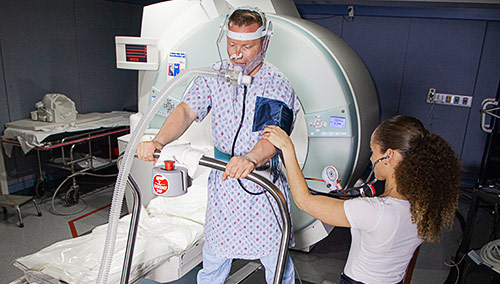
Exercise Cardiac MRI Technology Available Only at University Hospitals: The Center for Advanced Heart & Vascular Care (CAHVC) at University Hospitals Cleveland Medical Center is the only site in Northern Ohio where an exercise cardiac MRI on a treadmill or cycle ergometer is offered.
Cardiac MRI (cMRI) and exercise testing are both widely used, noninvasive cardiovascular tests. Cardiac MRI provides real-time images of the heart’s structure and function. Exercise testing, with or without cardiopulmonary stress, provides important physiologic evidence of exertional symptoms through continuous monitoring using electrocardiogram and breathing measurements.
The exercise test is a symptom limited test where you will use an ergometer (treadmill or recumbent bike) until you have reached peak exercise. If you are having an exercise test with cardiopulmonary stress, your breathing may also be measured during the exercise portion using a mouthpiece and nose clip if warranted by your doctor, in addition to monitoring your heart rate and blood pressure.
At University Hospitals, we led the development of approaches that combine the power, accuracy and diagnostic ability of a cardiac MRI and exercise testing to provide real-time images of the heart at rest and immediately post-exercise. Pharmacologic exercise MRI testing may also be used in patients who cannot exercise sufficiently to perform an adequate diagnostic or prognostic exercise test.
The new exercise cMRI consists of cMRI scans before and after and an exercise test performed either on a treadmill or in-scanner recumbent cycle ergometer.

This symptom limited exercise test is performed to peak exercise. Within 35 of exercise termination, post-exercise images will be obtained. Blood pressure, heart rate and breathing measurements will be continuously monitored by a certified exercise physiologist or experienced stress testing nurse.
Pharmacologic cMRI testing: This is also available for patients with orthopedic limitations or in a deconditioned state. Pharmacologic stress testing is available at both UH Cleveland Medical Center and UH Ahuja Medical Center in Beachwood, Ohio.
Anyone with known or suspected cardiovascular disease, who is otherwise eligible for an MRI and a cardiopulmonary stress test, is able to have this test.
Reasons to order an exercise cMRI:
- Evaluating patients with coronary artery disease
- Diagnosing valvular and congenital heart or blood vessel disorders to assess response to exercise
- Planning a patient’s treatment
- Monitoring the progression of heart disorders over time
- Evaluating the anatomy of the heart and blood vessels in adults with congenital heart disease
The new exercise cardiac MRI consists of two cardiac MRI scans (before and after exercise), and an exercise test, with or without cardiopulmonary stress, on a treadmill or cycle ergometer, or a pharmacologic exercise test.
Your heart rate and blood pressure will be continuously monitored throughout the exam by an experienced nurse or certified exercise physiologist. The pre-exercise cardiac MRI scan will require you to lay on a flat table without moving, after which you will complete the exercise test.
To date, the treadmill exercise stress cMRI test has been shown to be safe and feasible in healthy patients, patients with dyspnea, pulmonary hypertension, and with known or suspected cardiovascular disease. The MR machine does not interfere with ECG readings, and treadmill performance (i.e. speed and grade) does not differ between the MRI-compatible versus regular treadmill.
Pharmacologic testing is performed to simulate the effects of exercise on patients who are unable to exercise adequately. For the pharmacologic exercise test, a drug (Dobutamine or Regadenoson) will be administered through an intravenous (IV) catheter in your hand or arm. The medication will increase the blood flow through the arteries of the heart and simulate the effects of exercise.
Immediately following the exercise or pharmacologic test, you will have another MRI scan that will last up to 20 minutes. During this scan, a small amount of MRI dye (Gadolinium) will be administered through your IV.

The entire test may take up to 60 minutes from the beginning of the pre-exercise MRI to the end of the post-exercise MRI.
More information about potential risks and instructions for the exam are available by calling the CAHVC at 216-286-2600.




